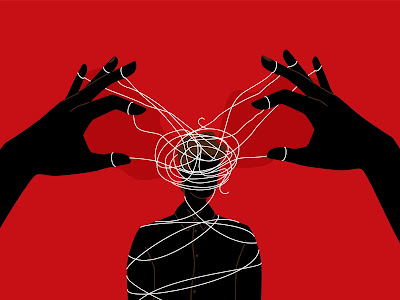Narcissism is the quality of a person to be so centered around themselves and their needs that they forget the needs of those around them.
Although narcissism as a trauma response is gaining a lot of popularity as a concept, it is important to remember that not all narcissists are a product of trauma. Individual experiences in life vary widely and a lot of factors can contribute to development of narcissistic personality disorder.
The Relationship
of Trauma and Narcissism
Let us first establish an understanding of the terms trauma and
narcissism.
Trauma is a deeply disturbing or distressing experience or
happenstance that affects the long term psychological state and mental well
being of a person.
Narcissism is the quality of an inflated sense of self importance and
neglect of other people's needs.
When an individual goes through a severe trauma like neglect, abuse or
abandonment, they attempt to protect themselves from further emotional damage
and sometimes this intention might lead them to maladaptive coping mechanisms.
A lot of times because of the feelings of inadequacy and
worthlessness, individual may develop a unique sense of self importance. This
is a filter that discredits criticism of any forming a protective armour. This
helps them in maintaining a temporary sense of control.
These survivors find it difficult to connect their emotions to anyone.
Sometimes the emotional connection to themselves will also be minimal. They
might thus, find it difficult to empathise with others going through a hard
time. This emotional detachment was once their defense mechanism from traumatic
mental friction.
They might also possess a constant need for appreciation and
validation to coat their feeling of inadequacy.
The relationship can be further explored in ‘The Body Keeps the Score’
by Bessel van der Kolk and ‘The Narcissistic
Parent’ by Craig Malkin.
Consequences of Narcissism Fueled by Trauma
The consequences can be devastating for all parties involved. Their relationships may often be characterized by one or many of the following factors-
1. Manipulation
2. Exploitation
3. Complete disregard of the feelings of others
4. Pattern of destructive behaviors like infidelity, financial abuse and emotional cruelty.
Even the person going through the syndrome may feel lonely, insecure, inadequate and an emotional turmoil inside the cover. These individuals might engage in abuse, self harm or even suicide in extreme cases. On the people involved in their life, a long cast may fall as impacts.
Impacts on Lives of Others
The impacts on their loved ones, specially their
partners can be scarring.
●
Narcissistic partners can be master
manipulators. They may use tactics like gaslighting, triangulation and silent
treatment to abuse their partner mentally. This can lead to emotional turmoil
in their partner and can go as far as causing anxiety and depression.
●
Narcissists are also big spenders.
They may lead their partner or parents to financial ruin by their impulsive
spending, bad investments or other bad financial decisions.
●
Narcissists may even want their
partner to socially isolate themselves and cut connections with relatives and
friends and make them feel like they ‘owe it to them’. If their partner does
that, it will leave them vulnerable to further abuse.
●
Narcissistic tendencies may prevent
these people to attach importance to the dignity of somebody else and may lead
to possessiveness towards their partner in a very materialistic way. This may
result in physical abuse of their partner. This may even fall on their
children.
●
Narcissists would often deploy
their children of emotional connection with them and neglect their emotional
needs driving the kids to feel invisible and unloved. They may also see their
kids objectively and expect them to provide for their emotional needs. They may
use their kids as emotional dumping grounds and may project their insecurities
on them. They may often look for personal games from their family.
Final Thoughts
Narcissism may or may not be a trauma response but if it
is, it may lead to a lot of emotional turmoil in the lives of all those
involved. They may lead an emotionally compressed life and play games with
others that will end up making them an irresponsible and emotionally exclusive
citizen of the society. Their near and dear ones would face the impacts in form
of emotional neglect, financial drain, abuse and manipulation. If someone knows
a person suffering through this, they must book an appointment with a
psychiatrist.
Written By Dixitaa Jaisinghani
This article has been authored exclusively by the writer and is being presented on Eat My News, which serves as a platform for the community to voice their perspectives. As an entity, Eat My News cannot be held liable for the content or its accuracy. The views expressed in this article solely pertain to the author or writer. For further queries about the article or its content you can contact on this email address - dixitaajaisinghani@gmail.com




.jpeg)







0 Comments